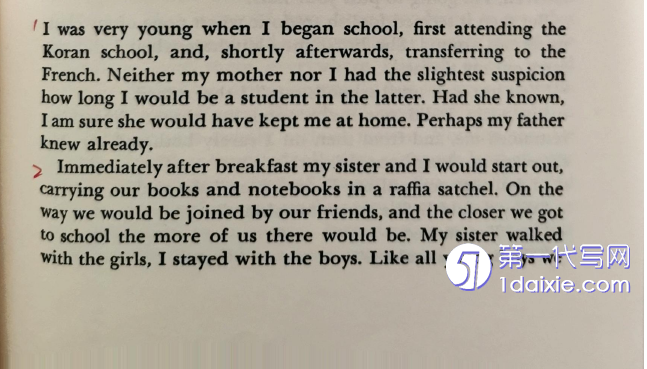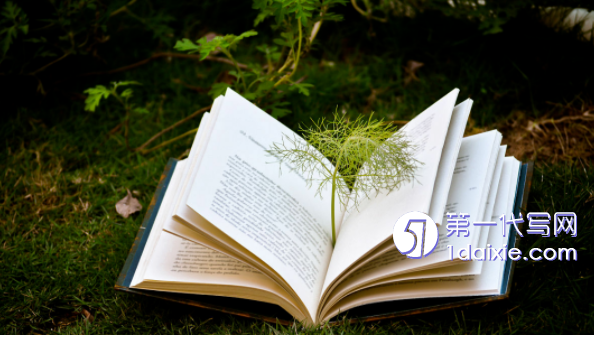本文是一篇英语毕业论文,本翻译实践选取《黑人男孩》作为原文,以“信达雅”标准为指导,从词汇,句法,语篇这三个层次对翻译进行考量。案例分析以环境和心理描写为例,集中展现在“信达雅”翻译标准的指导下探讨如何将自然环境和社会环境、人物心理的细致描写翻译得较为贴切生动,以较好地反衬故事情节,使读者深入理解小说内容和思想,感受原汁原味的非洲文化。
Chapter 1 Task Description
1.1 Selection of Source Text
The Dark Child is a novel which is recommended by the translator’s supervisor whogot this novel from her friend.On the whole,this novel is easy to understand.Thelanguage is lively,and it contains strong African features.China and Africa have strongtraditional friendship and good cooperative relations,so learning about Africa’s literaryculture plays an important role in China-Africa relationship.Moreover,the translator isinterested in African culture and she likes reading about African literature and history andwatching video tapes about African life,so the translator has a certain understanding ofthe continent of Africa.
After reading The Dark Child,the translator thinks she is qualified for translating thewhole book and the translation quality can be guaranteed.She wants to use this novel asthe source text and practice translation under the guidance of translation theory.Considering the source text is a literary novel,the translator translated the descriptions ofenvironment and psychology particularly.In order to present a high-quality translation,the translator discusses the translation work and revises the deficiencies with hersupervisor and classmates on online meetings once a week.

1.2 Analysis of Source Text
To do a better translation work,the translator needs to have a good understanding ofthe source text.It is necessary for translators to read and analyze the novel,so that in thissection,the translator gives a brief introduction and an analysis to the source text.
1.2.1 Introduction to source text
The Dark Child is a classic of African literature,and it is written by the Africanwriter Camara Laye in 1954.This edition was published in 1994 by The Noonday Press,and the third printing was in 1997.The translator spent more than a year translating thewhole novel.Due to space limitation,the translator attached the source text andtranslation work of Chapter 6 and Chapter 7 in this translation practice report.There are9,014 English words in Chapter 6 and Chapter 7,and they are translated into 14,705Chinese characters.
Chapter 2 Theoretical Framework
2.1 The Standard of FEE
Yan Fu was an influential enlightenment thinker,translator and educator in the QingDynasty.While translating the work Evolution and Ethics,Yan Fu adopted the standardof Faithfulness,Expressiveness and Elegance.
2.1.1 Introduction to FEE
China’s translation industry has a long history,which originated from translatingBuddhist sutras.There was a lack of systematic translation theory in translation practice,until Yan Fu proposed this translation standard,which filled the gap in translation theory.The standard of FEE plays an important role in the field of translation and has a profoundinfluence.It has been accepted by translators and readers until today.
Faithfulness means fidelity to the source text,which requires the target text must beaccurate,not deviated,not omitted,and not added or deleted at will.The key totranslation is understanding,because only what is fully understood can be betterexpressed(Yao,2022).The translator should accurately understand the meaning of everyword,and the structure of sentences in the source text.The translator should accuratelygrasp the cultural background knowledge reflected in the source text(Hu,2020).
2.2 Reasons for Choosing the Standard of FEE
Standard of FEE is suitable for literary translation(Chen,2022).This translationstandard summarizes the guiding principles of translation.Meanwhile,the standard ofFEE still has strong vitality today.
The principle of Faithfulness requires the translator to express the content of thesource text to the greatest extent.When translating literary works,the translator cannotadd or subtract the content at will to ensure the accuracy of the translation.Whentranslating a simple sentence,the translator should also think of the context so as toensure the readability of the translation.The principle of Expressiveness requires that thesentences in the translation works should be consistent with the source text in expressionhabits and should be fluent,so that the readers can understand.The principle of Eleganceis also the requirement of aesthetic appreciation put forward by people nowadays.Inshort,the translation of literary works must meet the reading requirements of readers andconform to the language style of the source text.The quality of literary translation can be improved by the correct application of the translation standard of FEE.In the process oftranslating foreign novels,the translator should faithfully convey the information andstyle characteristics of the source text on the premise of accurately understanding thesource text,and ensure the accuracy and conciseness of the translation work(Ji,2016).
Chapter 3 Translation Process ............................ 8
3.1 Pre-translation Readings ............................................... 8
3.1.1 Detailed reading of source text ............................... 8
3.1.2 Parallel text reading ................................. 9
Chapter 4 Case Analysis ..................................... 12
4.1 Faithfulness in Translation ............................. 12
4.1.1 Accurate understanding of words and sentences ....................... 12
4.1.2 Adequate reproduction of the style ............................................ 15
Chapter 5 Conclusion ........................................ 27
5.1 Gains in Experiences ................................. 27
5.2 Limitations and Suggestions ........................ 28
Chapter 4 Case Analysis
4.1 Faithfulness in Translation
“Faithfulness”means fidelity to the source text,and the translation must be accurate,not deviated,not omitted,and not added or deleted at will.In literary translation,translators should pay more attention to express the meaning of the novel accurately,without any mistakes.In this part,the translation of some typical sentences in the sourcetext will be analyzed from the perspective of accurate understanding and expression ofwords and sentences,and adequate reproduction of the style.
4.1.1 Accurate understanding of words and sentences
In the process of translating a novel,it is necessary to understand the source textmore accurately,so as to make the whole novel translated with reasonable plot andunderstandable meaning.
Example 1:
(ST=source text;TT=target text)
[ST]:The place is well known:it is situated under an enormous bombax tree,a hollow atthe junction of the river Komoni and the river Niger.(see Appendix A,p.56)
[TT]:这个地方众所周知:它位于一棵巨大的木棉树下,在科莫尼河和尼日尔河交汇处的一个洼地上。(see Appendix B,p.80)
[Analysis]:In this sentence,“hollow”must be a noun.The translator pondered over the meaning of the word when translated this sentence,“hollow”has several meanings,such as“凹陷处,坑洼处;坑,洞;山谷”.Considered that two river names appear later in the article,and there is no mention of mountains or caves,so it was not translated into“山谷”or“洞”.According to common sense,the junction of two rivers is generally a“洼地”Theword“junction”also has several meanings.Considering about the meaning of thissentence,the translator selected in several meanings and decided on the meaning of“交汇处”.This translation is consistent with faithfulness in translation.

Chapter 5 Conclusion
5.1 Gains in Experiences
Through translating The Dark Child,the translator gains a lot and has a deeperunderstanding of translation practice.
Firstly,the translator has got a further understanding of the translation practicereport.She read many translation practice reports to guide herself,being clearer about thestructure of translation practice reports.Through practice,the translator has deepened herunderstanding of a translation project.
Besides,in the process of translating this novel,the translator has learned a lot ofAfrican customs,landscapes,cultures and religious rituals.The translator has increasedher vocabulary in the above mentions fields.At the same time,the translator collectedsome cultural knowledge about Africa and compared it with Chinese culture.
Last,through translation practice,the translator realizes the importance ofpreparation before translation.The translator needs to understand the linguisticcharacteristics of the source text so that the translation retains the original style.Standardof FEE is suitable for literary translation.The translator can modify and polish thetranslation from Faithfulness,Expressiveness,and Elegance.For proper nouns,translators can consult electronic dictionaries or search for relevant content on theInternet.The translator enhanced her translation skills by tackling long and complexsentences,simplifying complex sentences,and utilizing more fitting vocabulary.Thetranslator can try to reflect the advantages of Chinese,such as using four-character wordsand Chinese two-part allegorical sayings in description of environment and psychology,in order to enhance the literary quality of the translation.
reference(omitted)
